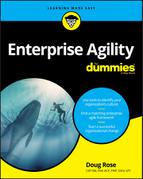About the Author
Doug Rose has been transforming organizations through technology, training, and process optimization for more than 20 years, and he now specializes in providing agile coaching and training for teams, programs, and organizations. He’s especially adept at introducing agile and Lean into organizations that take a traditional project-management approach to product development. Author of the Project Management Institute’s (PMI) first major publication on the agile framework, Leading Agile Teams, Doug helps his clients improve their organizational agility by coaching, instructing, and facilitating on the Scaled Agile Framework (SAFe), Scrum, Extreme Programming (XP), Kanban, Lean Software Development, Iterative Project Management, User Stories, Use Cases, and Retrospectives.
Doug has a master’s degree (MS) in Information Management, a law degree (JD) from Syracuse University, and a bachelor of arts degree (BA) from the University of Wisconsin–Madison. He’s also a Scaled Agile Framework Program Consultant (SPC), Certified Technical Trainer (CTT+), Certified Scrum Professional (CSP-SM), Certified Scrum Master (CSM), PMI Agile Certified Professional (PMI-ACP), Project Management Professional (PMP), and Certified Developer for Apache Hadoop (CCDH).
You can attend Doug’s lively and engaging business and project management courses at the University of Chicago or online through Lynda.com or LinkedIn Learning.
Doug works through Doug Enterprises, an organization with an office in whatever city he lives. Currently that’s in Atlanta, Georgia, where he spends his free time either riding a stationary recumbent bike or explaining the Marvel Universe to his son.
For more about Doug, visit his website at www.dougenterprises.com.
Dedication
For Jelena and Leo,
♪ ♫ You’re the wind beneath my wings. ♫ ♪
(That song will be in your head now. You’re welcome.)
Author’s Acknowledgments
When I graduated college, I found out that I had very few marketable skills. I did, however, have an interesting hobby. Instead of working on my term papers I found myself drawn to the beige boxy computers in the library. There I spent many hours exploring the full range of this new technology. But my self-taught computer skills weren’t enough to get me an early IT job. So, while working part time in a combination ice cream/burrito parlor, I picked up my first For Dummies book. It was the first edition of Networking For Dummies, by Doug Lowe.
Doug explained networking in a way that extremely accessible. Nowadays, it’s hard to imagine that anyone would ever need to write, “Networking … Why bother?” But at the time, networking skills were considered cutting edge. I was so pleased with this book that I picked up a second For Dummies book. It was UNIX For Dummies, by John Levine. He explained the history of this terrific operating system and how to get around using various “shells.”
These two books together gave me a pretty good understanding of how to set up a computer network and even do some basic server configurations. They didn’t make me an expert, but they gave me a high-level overview about the language and the concepts, and they helped me land my first IT job working at a computer lab at Northwestern University.
That’s why nearly a quarter-century later it’s deeply rewarding for me to publish my own For Dummies book. In this book I’ve tried to stick with what I liked about these earlier books. I’ve tried to keep things informal and accessible, and I don’t try to make any assumptions about what you might already know. Learning about new topics is fun. I try to remember that even when the topic is littered with acronyms, jargon, and needlessly obtuse language. These other authors understood that, and I tried to follow in their footsteps.
I’m happy to have the opportunity to thank the people who contributed to this book. First, I’d like to thank Amy Fandrei and the team at John Wiley & Sons, Inc. Amy created this opportunity and was very generous with her time and feedback. Joe Kraynak is simply the best editor I’ve ever worked with. He masterfully helped me reorganize the information in this book and enhanced the best parts while simultaneously showing me what to cut. I’d also like to thank Katharine Dvorak and Ken ‘classmaker’ Ritchie. They offered terrific guidance, and I appreciate their excellent suggestions. Also, special thanks to Sharon Kaplan for looking over early drafts. My wife was my first (and most critical) editor. After reading my drafts, she now threatens to teach organizational agility to political science PhD students.
I’d also like to thank the people in different organizations where I’ve done coaching and training. Without them I wouldn’t have had much material for this book and or enough material to keep Doug Enterprises going. Special thanks to Sally Elatta and her team at Agile Transformations. Also thanks to Cox Automotive and The Home Depot. I relied heavily on content and feedback from several enterprise agile framework developers as well. Thanks to Dean Leffingwell, Terri Groh, and Richard Knaster from Scaled Agile, Inc.; Craig Larman and Bas Vodde from Large-Scale Scrum; and Scott Ambler and Mark Lines from Disciplined Agile. Of course, thanks to the agile community for always coming up with new ideas and for having interesting and engaging conferences. Adriana Danaila did terrific work creating some of the graphics around key concepts.
Additionally, I’d like to thank the team at Lynda.com and LinkedIn Learning, where I have several courses on improving organizational agility. The feedback from these courses was instrumental in deciding what to include in this book. Finally, I’d like to thank the University of Chicago and Syracuse University. Both of these great institutions have given me the opportunity to teach agility to graduate students and lifelong learners, whose many questions were always on my mind as I wrote this book.
Publisher’s Acknowledgments
Senior Acquisitions Editor: Amy Fandrei
Editor: Joe Kraynak
Project Editor: Katharine Dvorak
Technical Editor: Ken ‘classmaker’ Ritchie
Proofreader: Debbye Butler
Sr. Editorial Assistant: Matt Lowe
Production Editor: Antony Sami
Cover Image: © Orla / iStockphoto
